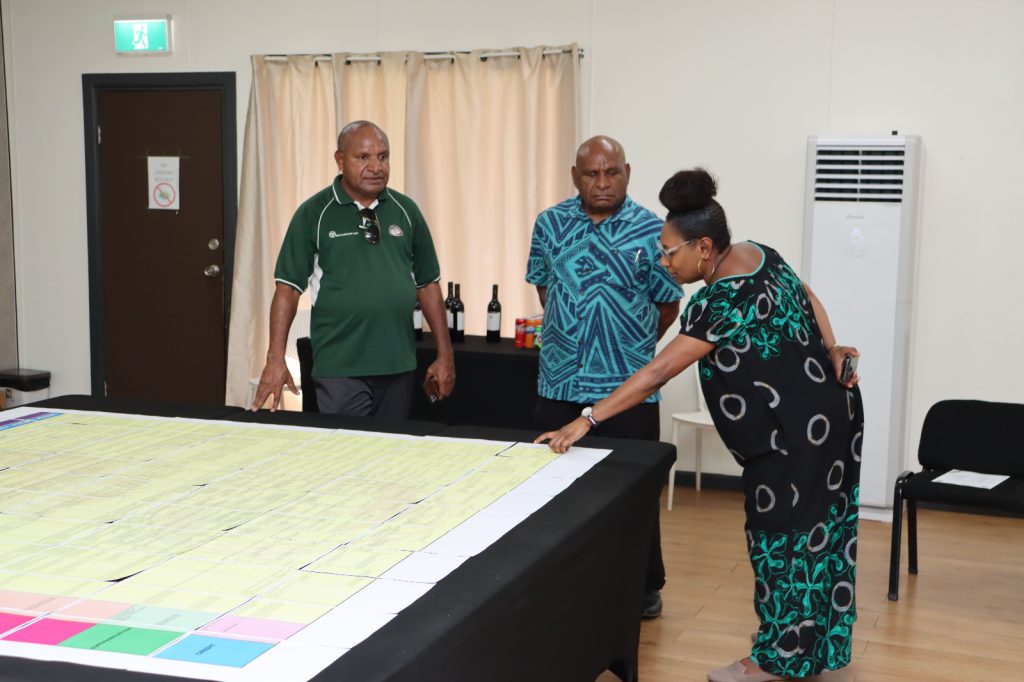Following a successful two-weeks Financial Education Curriculum Validation Workshop, held by the Centre for Excellence in Financial Inclusion (CEFI), in close partnership with the Department of Education (DoE) through its Curriculum Development Division (CDD), this has resulted in culminating in the delivery of 40 fully aligned educational resources.
Thus, this marks an important step in the implementation of the Financial Education in Schools PNG (FESPNG) Project.
The workshop was held from 5th–16th May 2025, and brought together a dedicated team of stakeholders, including officers from DoE-CDD, representatives from CEFI, and an external partner from Aflatoun International and Cufa to review and align 13 syllabuses, 13 Teacher Resource Books, and 13 Student Activity Books.
This thorough process resulted in the development of eight strands, 16 units, 16 content standards, and benchmarks, reinforcing a consistent and inclusive approach to financial literacy education across all grade levels.
The purpose of the workshop was to support the integration of Financial Literacy Education (FLE) into Papua New Guinea’s Standards-Based Curriculum from Preparatory to Grade 12 and to validate the financial education curriculum materials developed through collaboration between the DoE-CDD, CEFI, Aflatoun International and Cufa.
The objectives of the workshop were to ensure that the financial education content aligns with CEFI’s Financial Literacy Standards and Conceptual Framework, maintaining national relevance and consistency.
It also aimed to evaluate the developmental appropriateness of concepts across all grade levels, promoting coherent and age-appropriate progression.
Expert input was sought from financial literacy technical advisors to enhance the accuracy and contextual suitability of the content and additionally, feedback from CEFI and external partners was gathered to confirm the curriculum’s relevance to real-life financial challenges.
The workshop also validated the templates of the Teacher Resource Books and Student Activity Books to ensure they are well-structured, accessible, and practical for classroom use.
Mr. Steven Tandale, First Assistant Secretary at the DoE’s-CDD, praised the dedication and collaborative spirit of the workshop participants. He emphasized the critical role that writing, research, and continuous improvement play in curriculum development and encouraged educators to view challenges as opportunities brought for innovation.
Mr. Tandale also acknowledged the practical barriers to implementation such as logistics, printing, and delivery to remote schools but affirmed that the team’s resourcefulness had led to creative solutions, including improved communication methods and enhanced documentation strategies.
This collaborative effort emphasizes a shared commitment to integrating financial literacy into the Standards Based Curriculum from Preparatory to Grade 12.
The FE curriculum is critical in empowering students with essential financial knowledge, practical skills, and value-based learning fostering lifelong learning, financial resilience, and responsible citizenship.
In total, 40 educational documents have been produced across the three workshops (two similar workshops held in 2024), all of which were funded by CEFI and delivered in collaboration with the DoE.
This outstanding effort marks a national commitment to embedding financial literacy across all stages of formal education in Papua New Guinea.


1 Comment
Pingback: dlvr.it